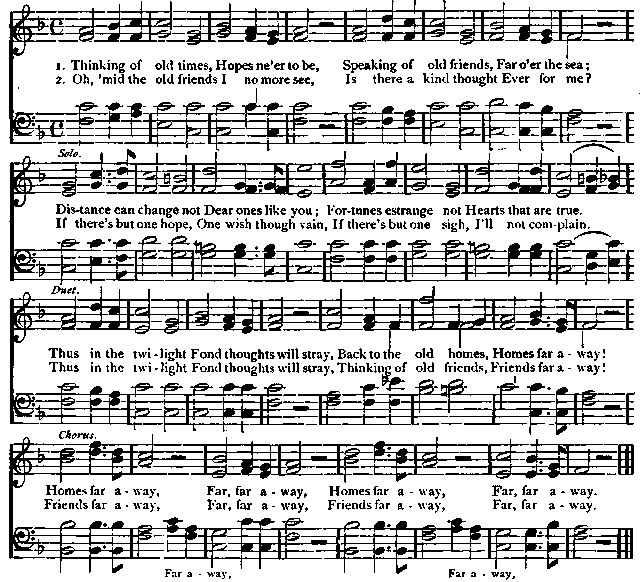Franklin Square Song Collection - online songbook
200 favorite songs and Hymns for Schools, Homes Lyrics & Sheet Music
| Share page | Visit Us On FB |
|
28 |
FRANKLIN SQUARE |
SONG collection: |
|||
|
Military Mrsir.—In the seventeenth century, we find the hautboy, an instrument of German origin, given to the dragoons and musketeers of the guard. We are indebted to the Hungarians, and through them to the eastern nations, for the kettledrum, the bassoon, and the true flute; for the tamborine to the Italians; the modern horn, to the Hanoverians; for the cymbals and big drum, to the Turks. The adoption of these last two instruments and the kettledrums, gave the name of Turkish music to certain military music. The combination of their instruments with the cavalry trumpet constituted, at the beginning of the eighteenth century, the entire musical scheme of the troops. Then each battalion, each company, had its particular and distinctive music. The drum, the |
fife, the horn, the bassoon, the big drum, and the cymbals belonged particularly to the infantry; the trumpet, the hautboy, the bagpipe, the kettledrum to the cavalry. An ordinance in France, in 1766, appointed a band of music to each regiment. It was composed of all the instruments which then belonged to the companies or sections of troops. The clarionet, invented in the beginning of the eighteenth century, by an inhabitant of Nuremburg, was not received into the military band of France before the year 1755. The serpent, invented in 1590, the triangle, which was the cymbal of the Middle Ages, and the trombone, entered successively into the different corps of the army. But it is only since 1792 that military music has been truly developed. Its utility has been |
||||
|
OLD FRIENDS AND OLD TIMES. |
J. R. Thomas. Per. S. Brainard & Sons. |
||||
|
|
|||||
 |
|||||
|
a frequent theme of discussion. Who does not know the grand effect of a national air played by a military band previous to an engagement ? The very, coward is fired with enthusiasm by the strains of some home or national melody. There is no feeling implanted in man's nature, which so veritably deserves the name of instinct as a love of music. To the soldier, especially in time of war, it is grateful beyond measure. On his weary march, it takes from his fatigue; in distant climes it carries him back to his home; in the hour of battle it arouses ambition and incites to noble deeds of courage. Indeed, music is one of the most beneficial «dd( nda to military improvement.—Moore. |
The proprietor of the Cyfarthfa iron works, Wales, organized among his men a brass band, which met for practice once a week, throughout the year. They numbered sixteen instruments. A visitor says, he heard them perform the overture to Zampa,the Caliph of Bagdad and FraDiavolo, with a number of waltzes, polkas, etc. They took up the time well, and the instruments preserved it with spirit and accuracy. These men were in the mountains of Wales and had never listened to other bands. Their habits and manners, appeared to have been improved under the softening influence of music, which, from a doubtful and difficult experiment, had become a pleasant pastime. |
||||